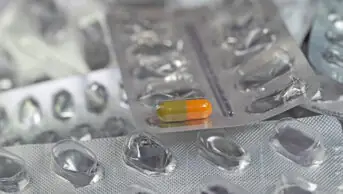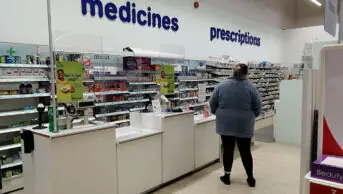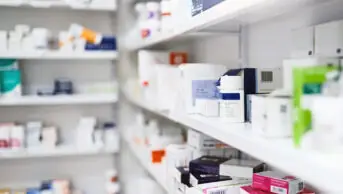
Healthcare Distribution Agency
With just over a month to go before the end of the Brexit transition period, reports of potential “chaos and confusion” at the ports are still the norm. On 24 November 2020, French authorities conducted a post-transition trial run, causing five-mile long queues of lorries in Kent. In October 2020, the British Generic Manufacturers Association said it was concerned that some trucks might not have the right paperwork when they arrive at the Channel ports, while the Association of the British Pharmaceutical Industry has warned of the extreme challenges faced by manufacturers under a no-deal arrangement.
But Martin Sawer, executive director of the Healthcare Distribution Association (HDA), insists he’s “comfortable with the preparations” for Brexit. While he acknowledges the risks of unforeseeable unknowns — and is keen for further clarity on exporting medicines to Northern Ireland— Sawer does not appear to share the same level of alarm as his peers.
The Pharmaceutical Journal interviewed Sawer, who represents wholesale suppliers of more than 90% of NHS medicines across the four UK nations, to find out why he’s confident in government and wholesaler plans to maintain medicine supplies come 1 January 2021 – at least for day one.
How are wholesalers gearing up for deliveries of the COVID-19 vaccine? Is that something they will be involved in?
The planning for the delivery of vaccines is well underway. And certain companies in the HDA have been discussing plans with NHS England to help get the COVID vaccines from government storage to the primary care network vaccination sites. Hospitals are transporting them themselves basically.
But, similar to the flu vaccines, the COVID vaccines should come through the wholesale and distribution sector. We’ve got the most difficult one first, potentially — Pfizer’s frozen product — which is a bit more complicated. Only a couple of wholesalers might be involved in that. But I hope in due course in 2021 as the other vaccines, which only require fridges, become available, we should be able to supply more widely.
Do you foresee any issues in terms of getting the vaccines from Pfizer’s plant in Belgium to the UK after the Brexit transition period ends?
I don’t think so. The six different COVID vaccines that the UK has ordered are made by global – usually branded – pharmaceutical companies, who will have worked out alternative routes, or how to stockpile in the UK. They will have put continuity plans in place because they have the resources to do so. I don’t think even a no deal Brexit will affect the supply of vaccines for COVID. Most companies would have done their continuity planning already, rather like we did in 2019.
Brexit is probably more of an issue for small manufacturers, who may not have the resources to plan around what potentially might happen
Brexit is probably more of an issue for small manufacturers, who may not have the resources to plan around what potentially might happen.
How confident are you that there are not going to be any problems with the supply of medicines on 1 January 2021?
Well, I’m confident that Department of Health and Social Care officials are working very closely with all the manufacturers and suppliers to understand plans in advance of 31 December 2020, whether there’s a deal or no deal. And, certainly, all the plans that were in place in 2019 have been reactivated.
But given the range of medicines that the UK has – almost 25,000 different lines – one can imagine that there is going to be a hiccup, probably somewhere. But that might not happen on day one. We might see that, because there’ll be stocks in the UK already, it’s when those stocks of a particular product might have trouble being replenished because of the borders, especially if there’s no deal, then there could be a supply issue further down the track after a month or two. But the government emergency routes will remain open at least until April 2021 to overcome issues such as that.
So, I’m confident on day one, everything is going to be fine. It’s a bit further on down the line, if there are hold ups at ports and what that knock on effect will be.
Do you think a hiccup in the supply chain could increase the number of shortages in the UK?
I’m not suggesting it’s going to cause widespread shortages at all. It just might be a shortage of some lines, and it would then depend on how critical that product (or products) is, as to whether that becomes a big issue or not.
It’s not going to happen on day one — it’s something that would be an unforeseen knock-on effect of just not getting a particular product through as smoothly as normal
It’s not going to happen on day one. It’s something that would be an unforeseen knock-on effect of just not getting a particular product through as smoothly as normal. That’s why the monitoring of the supply chain into the UK after January 2021 will be quite important.
Is that something that wholesalers can prepare for, in terms of passing medicines through the ports smoothly?
It’s the manufacturers who are responsible for getting the medicines to our warehouses in the UK.
The preparation for wholesalers will have been speaking to each of their manufacturer suppliers to be assured that supplies will be maintained whatever happens on 31 December 2020. If they can’t get a product, they would have to seek it elsewhere to make sure that their pharmacy, hospital and dispensing doctor customers are supplied.
What proportion of wholesalers would you say have had these conversations and will be fully ready come the end of the year?
I would have thought 100% of wholesalers would have done some planning for sure. And because of the challenge of a no deal in 2019, some of this will have been in play for two or three years by now.
Our main concern is to get a deal because there will be fewer regulatory barriers to medicines coming into Great Britain at the ports
Our main concern is to get a deal because there will be fewer regulatory barriers to medicines coming into Great Britain at the ports. And, indeed, part of that deal at the moment is the potential for mutual recognition for GB products as well. That would help with the issue of getting medicines into Northern Ireland.
Do you think the government really understands how complicated the supply of drugs is into the UK?
Yes, I think they do. They’ve learned a lot over the past couple of years and they’ve set up industry official working parties, which meet very regularly. And medicine supplies have been part of the EU-UK negotiations, especially in relation to Northern Ireland, because that is still a challenging nut to crack.
I think Northern Ireland is something we need to really focus on in the next couple of weeks. Supplies to Northern Ireland are under a lot of scrutiny as to how that will work after 1 January 2021, unless we get the border issue sorted out, because at least 80% of medicines to Northern Ireland start their journey in Great Britain.
How confident are you that it will be resolved successfully?
I’m holding my breath.
How have wholesalers adapted their supply chains or purchasing arrangements to cope with the demand of the pandemic?
We’re very pleased that the existing supply chain demonstrated its resilience and flexibility during the first wave in March and April 2020. The existing system was stressed to the extreme. We had a month’s demand of insulin to distribute in less than a week, when all of those prescriptions were written in the early stages of the pandemic for three months instead of 28 days. We were asked by the government if we needed assistance, but we said “let’s test the system first” – and it held up. That is a testament to the normal resilience of the supply chain, and how reliable it can be getting medicines to patients when they need them.
It’s never sensible to try to invent a new system in the middle of a pandemic. You can see that in other areas where new things were tried and haven’t worked.
Evidence you gave to the Health and Social Care Select Committee’s enquiry on lessons learned from the pandemic says that NHS England asked some wholesalers to purchase intensive care unit medicines, some of which expired while in wholesale. Can you quantify how much stock was wasted?
I was aware of the letters of intent in April 2020 time that our members were given to enable them to buy intensive care unit supporting medicines for COVID. But I don’t know the volumes. There were around 23 medicines covered by this to start with. Some were obviously used, and it will vary from wholesaler to wholesaler. But it was all the HDA wholesalers who supply hospitals, normally four of them were involved in that process. Of course, it was under a non-disclosure agreement, so I don’t have access to the financial details.


